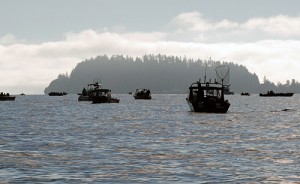 New rules shifting more fish in Columbia River Mainstem fisheries to recreational anglers will go into effect, despite legal challenges by commercial fishermen.
New rules shifting more fish in Columbia River Mainstem fisheries to recreational anglers will go into effect, despite legal challenges by commercial fishermen.
The Oregon State Court of Appeals denied a request by the gill netters that would have placed the new rules on hold until the legal challenges are sorted out. In the 22-page order which came out Tuesday morning, the court ruled the gill netters failed to establish irreparable harm or the likelihood that they would win on their case. The court went so far as to question some of the challenger’s legal arguments about economic impacts, that the new rules conflict with existing state law, and if they were given enough notice about the rule changes.
However, Northwest Sportfishing Industry Association officials are most excited about the courts statements about balancing the commercial fishing industry with the recreational fishing industry and recovery of salmon species. In addition, the court also stated that “the prior 50-50% or 60-40% allocation of ESA-impacts or harvest surpluses disproportionately favored commercial fishers and commensurately disadvantaged recreational fishers.”
The NSIA continues to support the defense of the lawsuit with the Coastal Conservation Association and the Oregon Department of Fish and Wildlife and has filed a brief in the case asking the court to uphold the new ODFW rules.
“This is great news for anyone who fishes in the Columbia system,” said Liz Hamilton, executive director of the NSIA. “We are optimistic about the final outcome of the case, and ready to work with the commercial fishing industry to shift our resources from court battles to solutions that work for the fish and both industries.”
Hamilton said the new rules reflect NSIA’s goals of providing a better economics for communities up and down the river, and more importantly, better protections for wild fish in the Columbia River system.
“Today’s ruling made us hopeful that we will see significant changes to allocation of salmon for recreational anglers,” Hamilton said. “We also value the court’s statements about the equal importance of sportfishing economics to that of the commercial fishing industry.”
If we are reading today’s decision correctly, the court indicated that the petitioners are not likely to prevail and now the rules can be implemented as the Oregon Fish and Wildlife Commission adopted. We are in for a brighter future for both the recreational and commercial communities along the Columbia River and the fish,” she said. “This will bring some of our species management efforts into the 21st Century.”
For more information contact Liz Hamilton at 503-631-8859 or at nsializ@aol.com.
